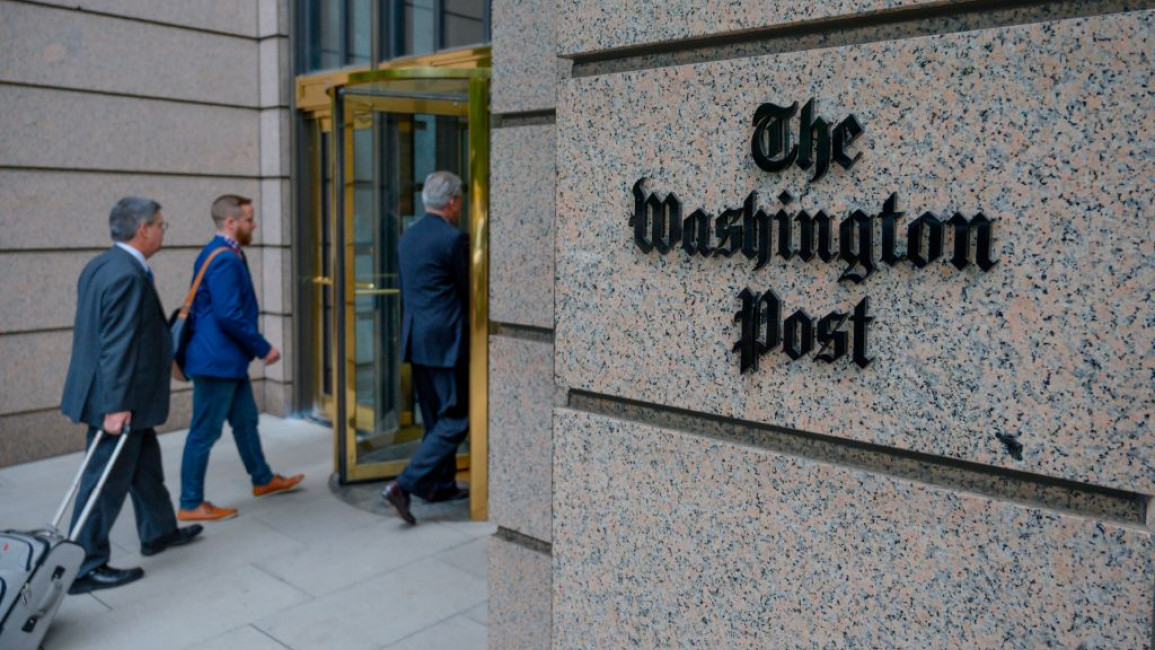Pro-Israel group targets The Washington Post correspondent over Gaza coverage
A US-based pro-Israel public relations firm has targeted a foreign correspondent for The Washington Post over her coverage of the war on Gaza.
Washington DC-based PR firm SKDK, which allegedly has close ties to the White House, also runs the communications of the 10/7 Project, an initiative established after the Hamas' 7 October attacks to advocate for greater US support for Israel.
US media Semafor reported on Monday that SKDK has been working publicly and behind the scenes to discredit journalists, such as The Washington Post's Louisa Loveluck, who have written on the suffering inflicted on Palestinians in Gaza.
SKDK shares daily memos on behalf of this group with journalists and newsrooms to allegedly influence their coverage and obtain corrections or additions to articles. But behind the scenes, it is also reportedly pursuing reporters over what the group feels are "biased" tweets and reports about Israel, and pressuring news organisations to remove journalists from the beat.
Loveluck, who has covered the Middle East extensively from Beirut and Baghdad, has recently come under fire by SKDK for her reporting on Gaza, which the PR firm apparently views as too critical of Israel.
SKDK reportedly dug up Loveluck's tweets dating back to 2009 as alleged evidence of her 'left-wing sympathies' and compiled them in a document.
They also reportedly categorized her activity on X, formerly Twitter since 7 October, into three sections: those considered to be critical of Israel, "supportive of the hostages", or mentioning Hamas.
The group then shared a five-page document with Semafor in what appears to be a bid to discredit Loveluck's Gaza coverage by highlighting what the group deemed to be a personal 'bias' against Israel.
The Washington Post responded in a statement defending its coverage without naming Loveluck.
"The Washington Post produces rigorous, in-depth journalism, and we expect and welcome scrutiny of our reporting,” a spokesperson said. "When we make errors, we take every step to correct them and to provide full transparency to our readers."
But the paper also recalled the difference between its reporting and its employees’ social media life.
"The Post expects our journalists to refrain from social media postings that could raise questions about our fairness or independence," the statement added.
In parallel, several senior journalists expressed their support for Loveluck.
"I’ve benefitted immensely from Louisa Loveluck’s dogged, humane reporting across the Middle East through an incredible period," Akbar Shahid Ahmed, Senior Diplomatic Correspondent for the Washington Post, wrote on X (formerly Twitter). "I'm glad to see the Post standing up behind her."
Like so many, I’ve benefited immensely from @leloveluck’s dogged, humane reporting across the Middle East through an incredibly complex period.
— Akbar Shahid Ahmed (@AkbarSAhmed) February 19, 2024
I’m glad to see the Post standing behind her. Hope more folks speak up against SKDK’s shoddy bid to silence crucial Gaza reporting.
"Louisa Loveluck is renowned as a fine, fearless & compassionate journalist," Liz Sly, a former The Washington Post correspondent, tweeted in support.
"Reporters with the Washington Post cover both sides of the Gaza story. That one who focuses on writing about Palestinian suffering should be singled out for criticism is a shame, not a scoop."
Louisa Loveluck @leloveluck is renowned as a fine, fearless & compassionate journalist. Reporters with @washingtonpost cover both sides of the Gaza story. That one who focuses on writing about Palestinian suffering should be singled out for criticism is a shame, not a scoop. https://t.co/omDM8wJX5D
— Liz Sly (@LizSly) February 19, 2024



